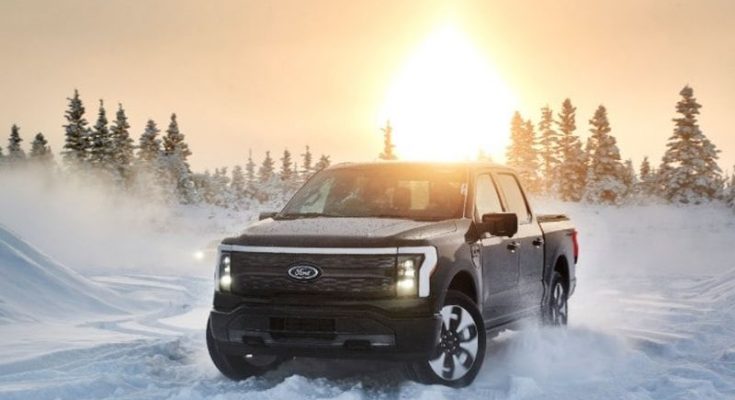This winter, Ford engineers spent two weeks in the heart of Alaska in minus 30-degree temperatures to continue fine-tuning the F-150® Lightning™ pickup’s performance on low-traction surfaces like snow and ice, and in extreme cold to give customers maximum confidence.
“Alaska provides us the extremely cold temperatures, snow and ice-covered surfaces that we need to push the F-150 Lightning in this type of testing, which is really focused on dialing-in how the truck delivers its power to the ground on slippery surfaces,” said Cameron Dillon, F-150 Lightning powertrain engineer. “Customers may not regularly see minus 30-degree mornings like we are seeing here, but they will see winter cold, snow and icy roads, and they should feel confident their F-150 Lightning is ready for all of it.”
Formally called low-mu testing, this type of powertrain evaluation looks at how the all-electric powertrain adjusts power delivery to the wheels on low-traction surfaces – usually snow and ice in extremely cold temperatures. And what better place to test than at a restricted military base in Alaska?
Ford engineers drove a fleet of six F-150 Lightning pre-production units on various types of wintery surfaces such as loose snow, packed-groomed snow, complete ice, half ice-half concrete surfaces and more in the freezing temperatures. The F-150 Lightning pickup can sense wheel slip and adjust power to the wheels within milliseconds, benefiting from the quick responses of the all-electric powertrain.
“F-150 Lightning in the snow is a very different ballgame compared to gas vehicles,” said Nick Harris, F-150 Lightning powertrain engineer. “The responses are extremely quick and the dual motors make it as if you have two engines pumping out power in one vehicle. A lot of our work is to coordinate the two motors to work together to best deliver torque to the ground, so that customers who drive in the snow and ice ultimately feel very confident.”
F-150 Lightning offers stability and confidence in slippery conditions thanks to benefits attributed to its all-electric powertrain, and Built Ford Tough functionality:
Standard dual motors front and rear
Standard always-on 4×4
Quick torque delivery
Standard electronic-locking rear differential
Selectable drive modes
Low center of gravity for even more confident handling
Engineers are able to adjust the calibration in real-time while testing, helping to maximize efficiency during the 12-hour test days. In addition to Alaska, the F-150 Lightning powertrain team has conducted low-mu testing in Michigan’s Upper Peninsula, Borrego Springs, Johnson Valley, and at Ford’s Michigan Proving Grounds near Milford, just one of many elements of the robust Built Ford Tough endurance regime the F-150 Lightning goes through.
Customer deliveries of the 2022 F-150 Lightning truck begin this spring.
Source: Ford

